Are you struggling to remove a stubborn stain from your beautiful quartz countertop? Don’t worry, we’ve got you covered.
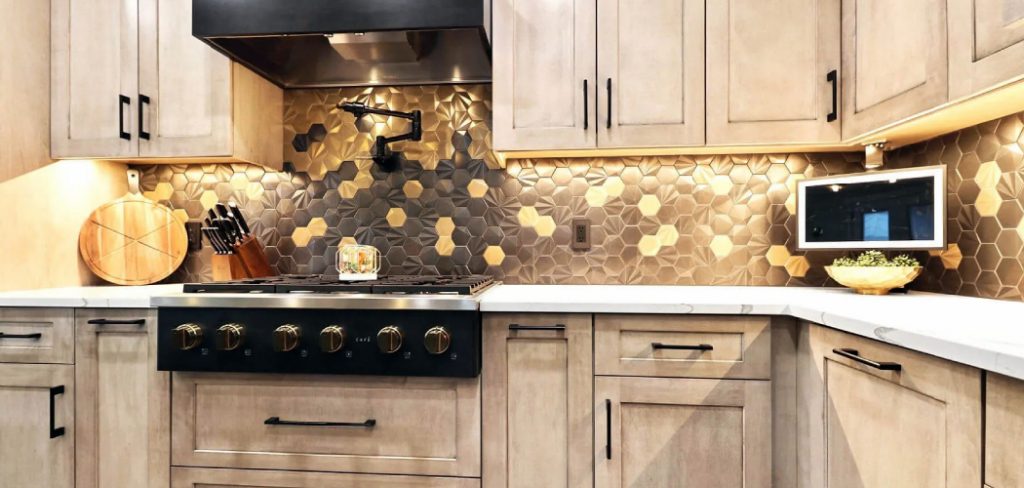
Quartz countertops are an elegant and durable addition to any kitchen or bathroom, prized for their low maintenance and stain-resistant properties. However, despite their resilience, quartz surfaces can occasionally fall victim to stubborn stains from coffee, wine, oil, or other everyday substances. Knowing the right techniques and products to use is essential to keep your countertop looking pristine without causing any damage.
In this guide on how to get a stain out of quartz countertop, we’ll explore step-by-step methods to effectively remove stains from quartz countertops and restore their original shine. Let’s dive in the tips and tricks!
What Are the Benefits of Quartz Countertops?
Before we get into the nitty-gritty of stain removal, let’s quickly go over why quartz countertops are a popular choice for many homeowners and designers.
- Durability: Quartz is one of the hardest minerals on earth, making it highly resistant to scratches, chips, and cracks. This durability means your countertops will last for years without major repairs or replacements.
- Stain Resistance: As mentioned earlier, quartz is non-porous, which means it does not absorb liquids like other natural stones do. This makes it highly resistant to stains from substances commonly found in a kitchen or bathroom setting.
- Low Maintenance: Unlike granite or marble countertops, which require regular sealing to maintain their appearance, quartz countertops are virtually maintenance-free. They only need occasional cleaning with mild soap and water to keep them looking as good as new.
Now that we know the benefits of quartz countertops, let’s move on to how to get rid of those pesky stains!
What Will You Need?
- Dish soap or mild detergent
- Warm water
- Microfiber cloth or soft sponge
- Plastic scraper or putty knife (for dried stains)
- Baking soda and water paste (for tougher stains)
- Glass cleaner (optional)
Once you have all your supplies ready, it’s time to start removing those stains.
8 Easy Steps on How to Get a Stain Out of Quartz Countertop
Step 1: Identify the Type of Stain
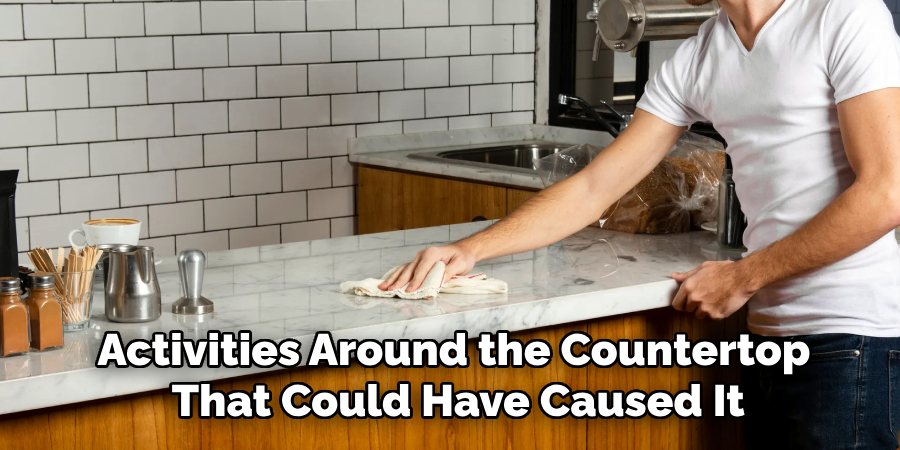
Before tackling a stain on your quartz countertop, it’s essential to determine what kind of stain you’re dealing with. Different substances require different cleaning approaches, so identifying whether the stain is caused by food, grease, hard water, or something more stubborn like ink or permanent marker will help you choose the most effective method. Take a closer look at the stain and think about any recent spills or activities around the countertop that could have caused it. For example, coffee or wine stains may light discoloration, while grease might leave a dull, oily residue. Once you’ve figured out the source, you can move on to the appropriate cleaning technique in the following steps.
Step 2: Gather the Necessary Cleaning Supplies
Once you’ve identified the type of stain, gather the appropriate cleaning supplies for the job. You might need a soft microfiber cloth, mild dish soap, warm water, a non-abrasive sponge, and possibly a specialized quartz cleaner for tougher stains. Avoid harsh chemicals or abrasive materials, which can damage the quartz surface. Having all your supplies ready will make cleaning smoother and more efficient.
Step 3: Test the Cleaning Solution
Before applying any cleaning solution to the stain, it’s crucial to test it on a small, inconspicuous area of the quartz surface. This ensures that the solution won’t cause any discoloration or damage. Apply a small amount of the cleaner to the test area and wait a few minutes. Wipe it away with a clean microfiber cloth and inspect the spot for any adverse effects. If the surface looks fine, you can confidently clean the stained area.
Step 4: Apply the Cleaning Solution
Once you’ve tested the cleaning solution and confirmed it is safe, apply it directly to the stain on the quartz surface. Use a non-abrasive sponge or a soft microfiber cloth to scrub the stained area in circular motions gently. Avoid applying too much pressure, as this could potentially harm the surface. Continue scrubbing until the stain begins to lift. If necessary, reapply the cleaning solution and repeat the process for more stubborn marks.
Step 5: Rinse and Dry the Surface
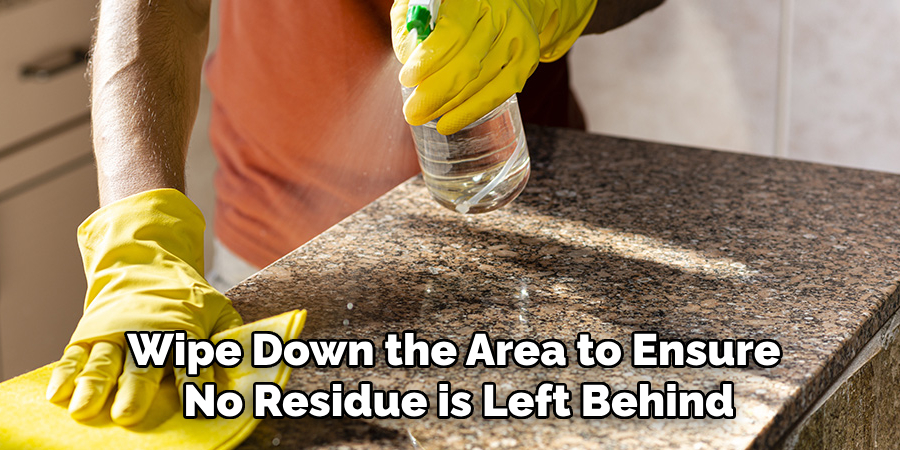
After successfully removing the stain, it’s essential to rinse the quartz surface thoroughly to remove any remaining cleaning solution. Use a clean, damp microfiber cloth and wipe down the area to ensure no residue is left behind. Once rinsed, use a dry microfiber cloth to gently buff the surface, restoring its natural shine and preventing water spots. This final step helps maintain the quartz’s pristine appearance and ensures it remains in excellent condition.
Step 6: Prevent Future Stains
It’s essential to take preventive measures against future stains to keep your quartz surface looking flawless. Always clean up spills immediately, especially from acidic substances like wine, coffee, or citrus juices. Use coasters, trivets, and cutting boards to minimize direct contact with potentially damaging materials. Regularly clean the surface with a gentle cleaner and a microfiber cloth to maintain its shine and durability. With proper care, your quartz will stay beautiful and stain-free for years.
Step 7: Keep an Eye Out for Dried Stains
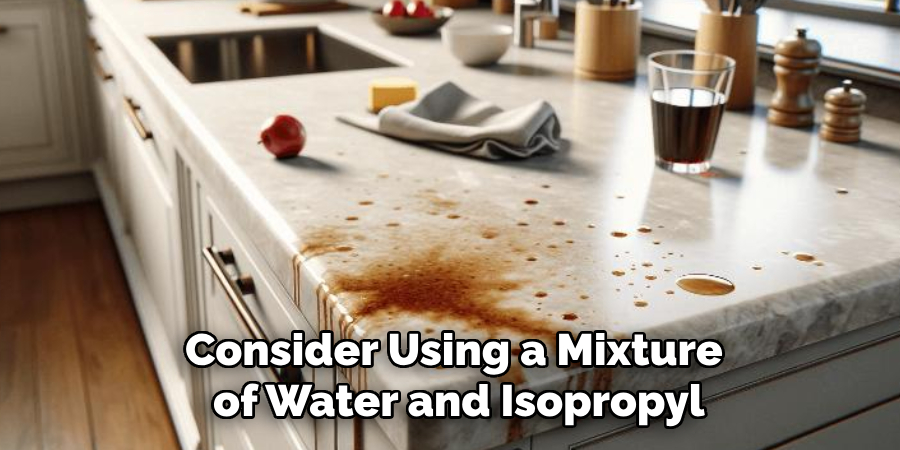
Even with the best preventive measures, dried stains can occasionally occur on your quartz surface. It’s essential to tackle these stains promptly to prevent them from becoming permanent. To address dried stains, use a plastic scraper to gently loosen and remove any hardened residue. Avoid using sharp tools as they can scratch the surface. Once the residue is removed, apply a small amount of a non-abrasive cleaner to the area and rub it in a microfiber cloth using circular motions. For more stubborn stains, consider using a mixture of water and isopropyl alcohol or a quartz-safe cleaner according to the manufacturer’s instructions.
Rinse the area thoroughly with warm water and dry with a clean towel to restore the surface’s original shine. Staying vigilant with dried stains will help maintain the elegance and longevity of your quartz countertops.
Step 8: Create a Baking Soda Paste
Creating a baking soda paste can effectively tackle stubborn stains that resist removal through traditional cleaning methods. Baking soda is a natural, gentle abrasive that can lift stains without damaging the surface of quartz countertops. To make the paste, mix equal parts of baking soda and water in a small container until the mixture forms a thick, spreadable consistency. Once the paste is ready, apply it to the stained area, ensuring complete coverage. Allow the paste to sit on the stain for 10-15 minutes to loosen the residue effectively.
After resting, gently scrub the area using a non-abrasive sponge or a soft-bristled brush in circular motions. Once the stain lifts, rinse the area thoroughly with warm water and wipe it dry using a clean microfiber cloth.
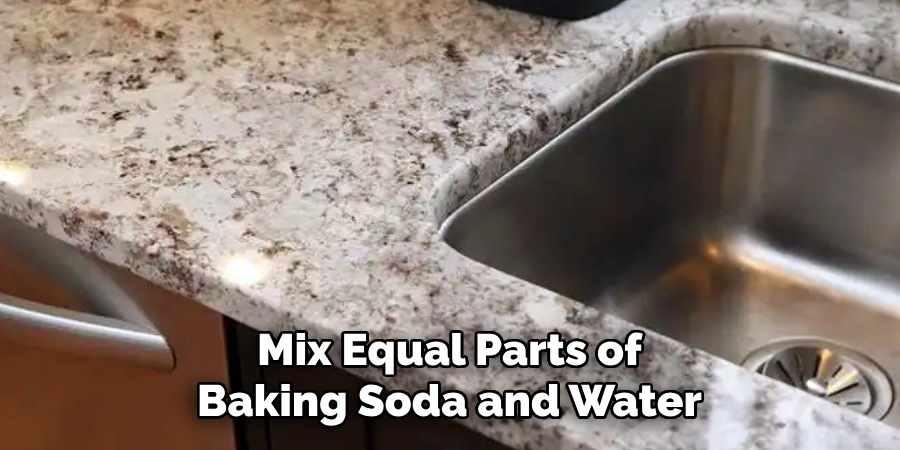
By following these steps, you can effectively remove stains from your quartz countertops and keep them looking pristine for years.
5 Things You Should Avoid
- Avoid Using Harsh Chemicals: Strong chemicals such as bleach, ammonia, or oven cleaners can damage the surface of your quartz countertop. These substances may break down the resin, leading to discoloration or a dull finish.
- Avoid Abrasive Scrubbing Pads: Scrubbing pads, steel wool, or other rough materials can scratch the surface of quartz. Stick to soft sponges or microfiber cloths to safely clean the area.
- Avoid Allowing Stains to Sit for Too Long: Timing is critical when dealing with spills or stains. Leaving substances like coffee, wine, or oil on the countertop for extended periods can make them harder to remove and may lead to permanent staining.
- Avoid Excessive Heat Exposure: Placing hot pans or pots directly on the quartz surface can cause thermal shock, resulting in cracks or discoloration. Use trivets or hot pads to protect your countertop.
- Avoid Cutting Directly on the Surface: While quartz is durable, using it as a cutting board can lead to unnecessary scratches. Always use a cutting board to maintain the pristine look of your countertop.
Will Baking Soda Damage Quartz Countertops?
Baking soda is a popular natural cleaner often used for household cleaning tasks. However, when it comes to quartz countertops, there are conflicting opinions on whether or not baking soda can damage the surface.
Some sources claim that baking soda can be too abrasive and may scratch the surface of quartz. On the other hand, others argue that baking soda is safe to use as a gentle scrub for tough stains.
The truth lies somewhere in between. While baking soda itself may not cause any harm to your quartz countertop, its texture can make it abrasive when used with too much pressure. Be cautious when using baking soda on your quartz countertop and always test it on a small, inconspicuous area first.
Conclusion
How to get a stain out of quartz countertop requires a gentle and mindful approach. Start by addressing the stain as soon as possible to prevent it from setting.
Clean the area with a soft cloth or sponge with warm water and mild dish soap. For tougher stains, consider using a non-abrasive cleaner or a paste made from baking soda and water, applied carefully and without excessive pressure. Avoid harsh chemicals, steel wool, or other abrasive tools that could damage the surface.
By taking these steps, you can effectively maintain the beauty and durability of your quartz countertop.
Professional Focus
Angela Ervin, a former interior designer turned blogger, specializes in kitchen design and renovations. Through her website, she blends her passion for cooking with design expertise, sharing practical and creative ideas. Known for balancing functionality and beauty, Angela’s insightful content has made her a trusted voice in home design and lifestyle.
About the Author
Angela Ervin, an experienced interior designer and blogger, combines her passion for kitchen renovations with storytelling. Living in Petersburg with her family, she enjoys cooking and testing her projects firsthand. Known for her humor and relatable style, Angela shares creative, functional design insights through her content, making her a trusted voice in home design.
Education History
University: Virginia Commonwealth University
Degree: Bachelor of Fine Arts (BFA) in Interior Design
- Angela’s education at VCU focused on mastering core interior design principles, including spatial planning, color theory, materials selection, and sustainable design practices.
- She gained hands-on experience through studio projects and collaborative design exercises, which honed her ability to create functional and aesthetically pleasing environments.
- Her coursework also emphasized problem-solving and practical applications of design, preparing her for real-world projects like her self-directed kitchen renovations.
- The program’s strong foundation in both technical skills and creative expression shaped Angela’s ability to seamlessly integrate form and function in her work.
